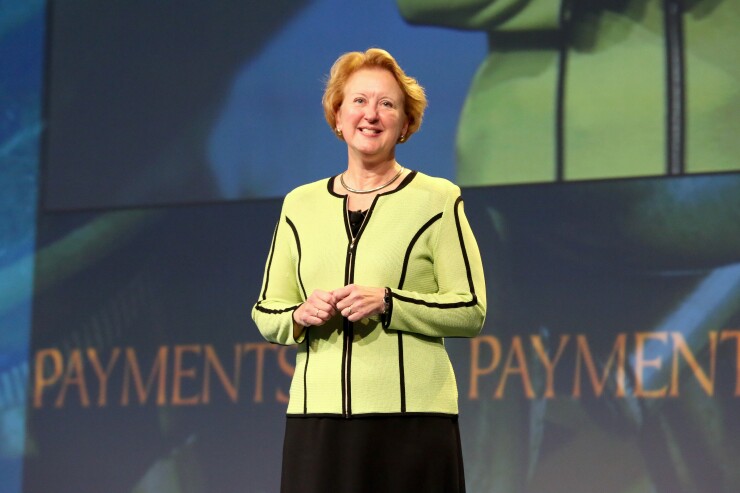Want unlimited access to top ideas and insights?
Janet Estep has been one of the most visible figures in the faster payments movement, battling for years to get reluctant banks on board with this vision.
Estep, the president and CEO of the electronic payments association Nacha and one of PaymentsSource's Most Influential Women in Payments for 2017, scored a major breakthrough in that battle last year. The Fed set its same-day ACH plans to match Nacha's, in effect making "faster payments" a reality after years of stagnation in the U.S.
But Estep, who has frequently spoken and

"Frustration is caused by wanting to read and absorb everything, and simply not having the time to do that," Estep said. "The best lesson I’ve learned from a younger colleague is to practice patience. Patience, combined with close listening, can actually help an individual take action more rapidly than if patience is not practiced."
Patience is, in fact, not an enemy of speed and can actually help move projects forward, according to Estep.
"Patience truly allows for good listening, which is essential to understand all sides of an issue or to gain knowledge of facts required to answer a question," Estep said. "With the acquired background and information, decisions can be made to move the industry forward or to make solid decisions required of a leader."
If not managed, the pace of change can actually stress the economy and learning, she said. "Decades ago, when change was much less rapid, textbooks and topics were resilient for many years," Estep said. "In today’s environment, it is essential to adapt rapidly, and that includes adapting key skills training."
With the rapid pace of change, we also may not pause to reflect upon the benefits of change or the lessons learned, Estep said. "If we do so, we can be more adept at avoiding repeat mistakes and we can build off of success. One of the key things that we can teach everyone is to 'learn to learn.'”
Estep's expertise with speed and change isn't limited to payments. It's also been an indelible part of her life. The St. Olaf College, Minn., graduate has a
"Two skills have been most valuable: The permission I've given myself to always ask questions — this has allowed me to learn from other people, and to engage in conversations that otherwise may not happen — and analytical thinking as an innate skill set," she said. "It has helped me to analyze situations, to consider 'what if' scenarios, and to therefore better plan for the future."
Individuals who are open to an environment of constant learning, along with the ability to adapt, will be much more successful, said Estep, who keeps a laptop with her whenever she can to stay informed, work and learn. She also keeps a picture of her family to say grounded and remember to "slow down" to appreciate what's important.
"I am a strong supporter of a liberal arts education that focuses on the development of key analytical, writing and communication skills that allow individuals to become lifelong learners and flexible contributors to any organization," she said.





